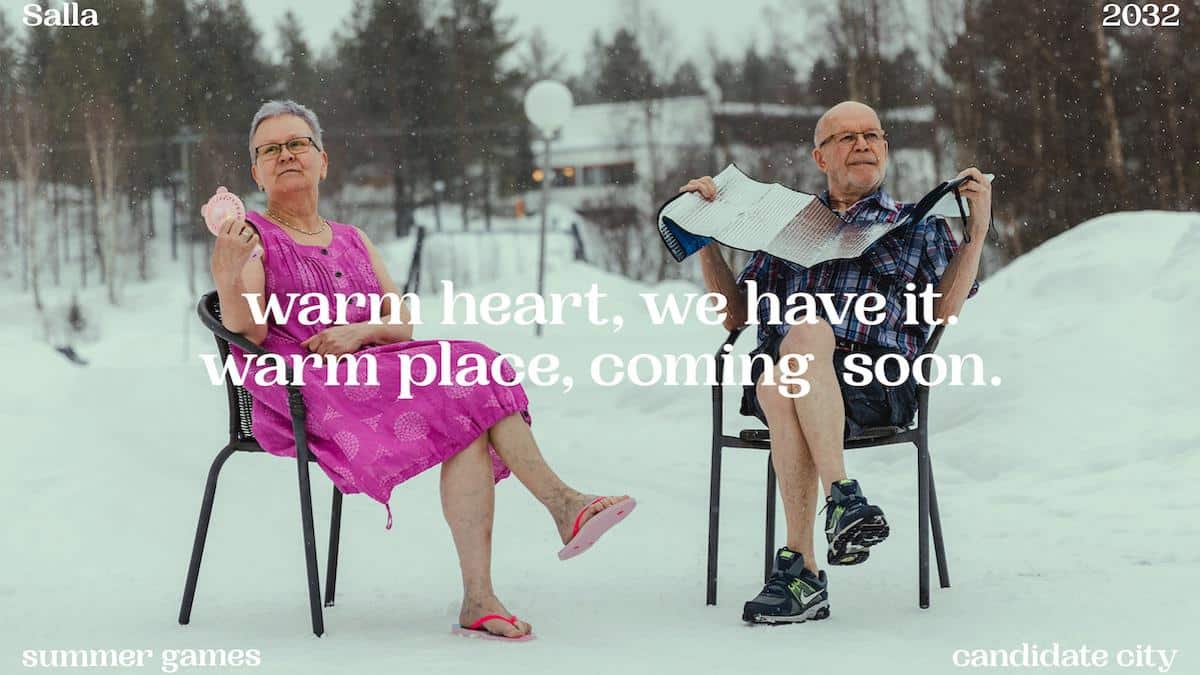
Crazy Idea? One of World’s Coldest Towns Bids to Host 2032 Summer Olympics

#SaveSalla is a campaign launched by a Finnish community in partnership with the youth climate movement Fridays for Future. www.savesalla.org
By Jessica Corbett
With temperatures across the globe — and particularly in the Arctic — rising due to lackluster efforts to address the human-caused climate crisis, one of the coldest towns on Earth is throwing its hat in the ring to host the 2032 Summer Olympics.
Salla is located in Finland’s Lapland region and touts the tagline, “in the middle of nowhere.” The average temperature is below freezing and the area boasts a ski resort, reindeer park, Arctic Circle safaris, and even a snow and ice hotel.
With support from Fridays for Future — the youth-led movement launched by Swedish teenager Greta Thunberg — Salla announced its Olympic bid to build awareness about “the consequences of global warming and the need for urgent action.”
“Our intention here is clear: we want to keep Salla as it is, and our winters cold and full of snow,” said Salla Mayor Erkki Parkkinen. “So, there was this crazy idea: to host the Summer Games in one of the coldest towns on the planet.”
“If we stand back and do nothing, letting global warming prevail,” Parkkinen warned, “we will lose our identity, and the town we love — as well as many others around the world — will cease to exist as we know it.”
The campaign, detailed at www.savesalla.com, includes a short video.
Watch:
“Despite the obviousness of the global warming, the ideology of climate change denial is gaining traction all over the world and increasing every year,” the campaign website says. “So, we’ve created this bid to raise attention about the climate emergency. Salla is changing. The whole planet is changing. Not in a good way.”
As Common Dreams has reported, while projections for the entire planet are dire if policymakers don’t urgently work to “effect unprecedented transitions in all aspects of society, including energy, land and ecosystems, urban and infrastructure as well as industry,” the Arctic is particularly at risk.
“We have only one planet to live in and an immense responsibility to future generations. We can all make a difference. What we cannot do under any circumstances is deny the problem and omit ourselves. The risks will be severe and unavoidable,” said Joe Hobbs, a Fridays For Future activist and operations director for Climate Cardinals. “Global warming does not have to be a self-fulfilling prophecy and everyone can make a significant and decisive contribution to stop this process.”
Hobbs joined Parkkinen and multiple experts for a press conference about the campaign on Tuesday.
The event came a day after a new study that showed ice loss worldwide is increasing at a record rate. Lead author Thomas Slater of Leeds’ Centre for Polar Observation and Modeling said that “although every region we studied lost ice, losses from the Antarctic and Greenland ice sheets have accelerated the most.”
“The ice sheets are now following the worst-case climate warming scenarios set out by the Intergovernmental Panel on Climate Change,” Slater added. “Sea-level rise on this scale will have very serious impacts on coastal communities this century.”
Also on Monday, Thunberg delivered an address to the World Economic Forum’s annual meeting — held digitally rather than in Davos, Switzerland this year because of the raging coronavirus pandemic. She told political and business leaders that “when it comes to facing the climate emergency, the world is still in a state of complete denial.”
“Safeguarding the future living conditions and preserving life on Earth as we know it is voluntary. The choice is yours to make,” the 18-year-old Swede said. “But I can assure you this: You can’t negotiate with physics. And your children and grandchildren will hold you accountable for the choices that you make.”
Reposted with permission from Common Dreams.

 233k
233k  41k
41k  Subscribe
Subscribe 